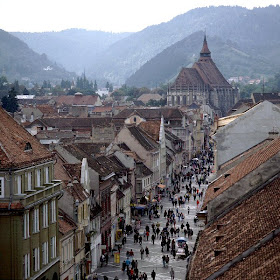
Braşov (pronounced [braˈʃov]; Hungarian: Brassó; German: Kronstadt; Medieval Latin: Brassovia or Corona) is a city in Romania and the capital of Braşov County, with a population of 284,596, according to the 2007 census.
It is the 7th largest Romanian city, after Bucharest, Cluj-Napoca, Timişoara, Iaşi, Craiova and Galaţi. People from Braşov are known, in English, as Braşovean.
Braşov is located in the central part of the country, about 166 km from Bucharest. It is surrounded by the Southern Carpathians, and is part of the Transylvania region.
The city is notable for hosting the Golden Stag (Cerbul de Aur) international music festival.
The city was first atested in the 13th century under the name Corona. The current Romanian and Hungarian names are derived from the Pecheneg word, barasu, meaning "fortress". On Tâmpa Mountain, located on the southern side of the city, there was a citadel called Brassovia, which gave both the Romanian and the Hungarian name of the city.
The first attested mention of Braşov is Terra Saxonum de Barasu ("Saxon Land of Baras"), in a 1252 document. The German name Kronstadt means "Crown City", and is reflected in the city's coat of arms, as well as in its Medieval Latin name, Corona. The three names of the city (Braşov/Brassó, Kronstadt, and Corona) were used simultaneously in the Middle Ages.
From 1950 to 1960, during part of the Communist period in Romania, the city was called Oraşul Stalin (Stalin City), after the Soviet leader Joseph Stalin.
It is the 7th largest Romanian city, after Bucharest, Cluj-Napoca, Timişoara, Iaşi, Craiova and Galaţi. People from Braşov are known, in English, as Braşovean.
Braşov is located in the central part of the country, about 166 km from Bucharest. It is surrounded by the Southern Carpathians, and is part of the Transylvania region.
The city is notable for hosting the Golden Stag (Cerbul de Aur) international music festival.
The city was first atested in the 13th century under the name Corona. The current Romanian and Hungarian names are derived from the Pecheneg word, barasu, meaning "fortress". On Tâmpa Mountain, located on the southern side of the city, there was a citadel called Brassovia, which gave both the Romanian and the Hungarian name of the city.
The first attested mention of Braşov is Terra Saxonum de Barasu ("Saxon Land of Baras"), in a 1252 document. The German name Kronstadt means "Crown City", and is reflected in the city's coat of arms, as well as in its Medieval Latin name, Corona. The three names of the city (Braşov/Brassó, Kronstadt, and Corona) were used simultaneously in the Middle Ages.
From 1950 to 1960, during part of the Communist period in Romania, the city was called Oraşul Stalin (Stalin City), after the Soviet leader Joseph Stalin.
1
ReplyDeleteThe city is notable for hosting the Golden Stag (Cerbul de Aur) international music festival. sofa set cover price , king size velvet bed sheet ,
ReplyDelete